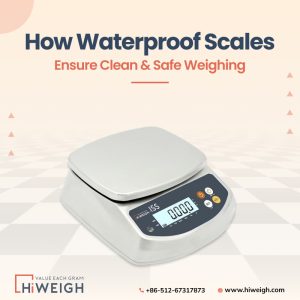


In businesses where hygiene is critical, for example, in food processing, pharmaceuticals, and healthcare, maintaining cleanliness is not optional. Precise weighing is an important part of these processes, but having scales that are not capable of resisting standard cleaning and sanitising can undermine both cleanliness and accuracy. High-accuracy waterproof scales come into play here. Built to withstand wet and humid environments, waterproof scales allow companies to achieve strict hygiene levels while guaranteeing dependable performance. This blog discusses why waterproof scales are necessary for clean weighing and how they can transform cleanliness in delicate environments.
The Significance of Sanitary Weighing
Hygienic weighing is essential in industries where contamination can result in serious repercussions, like food poisoning, damaged medical goods, or ineffective drugs. Ensuring cleanliness during weighing prevents contaminants from being introduced into the end product. For instance, in the food industry, residual materials from earlier productions can result in cross-contamination, affecting the quality and safety of the product. In pharmaceutical facilities as well, contamination can degrade the effectiveness of drugs and result in regulatory failure.
Maintenance through regular cleaning and sanitising of weighing equipment is key to the attainment of such hygiene levels. But conventional scales are not always as durable as required to support repetitive exposure to water, chemicals used for cleaning, and other sanitising treatments. Waterproof scales are designed to overcome this limitation, providing an extremely durable solution for environments where hygiene is critical.
Check out this post on What Will No One Tell You About Waterproof Scales?
What Sets Waterproof Scales Apart?
Waterproof scales are built with materials and functions that are resistant to water entry, corrosion, and cleaning agent damage. Their main features are:
Sealed Designs: Waterproof scales possess sealed housings that are tightly enclosed to ensure water, dust, and other foreign substances cannot reach delicate components. This guarantees that the inner mechanisms are not disturbed when cleaning.
Corrosion-Resistant Materials: Scales are usually made of stainless steel or other corrosion-resistant materials that are durable enough to resist strong cleaning agents and repeated exposure to water.
Advantages of Water-Resistant Scales for Hygienic Weighing
1. Improved Sanitation
Waterproof scales can be completely cleaned and sanitised without the possibility of damage. This is particularly crucial in food processing, where equipment is constantly exposed to liquids, oils, and other residues. The ability to use water or cleaning solutions to wash the scales ensures they are free from contaminants, which is a boost to product safety overall.
2. Endurance in Harsh Environments
Conventional scales will fail or deteriorate when wet or immersed in humid conditions. Waterproof scales, however, are designed to withstand these conditions. Their sealed construction and corrosion-resistant materials guarantee continuous performance despite harsh environments, which lessens the frequency of replacement.
3. Compliance with Regulatory Standards
Food manufacturing and pharmaceutical companies are subject to strict hygiene rules, such as HACCP (Hazard Analysis and Critical Control Points) and GMP (Good Manufacturing Practices). Waterproof scales assist in adhering to these requirements by allowing proper cleaning and ensuring hygienic procedures.
4. Precise and Reliable Measurements
Contaminants and residue can interfere with the accuracy of weighing equipment. Waterproof scales address this issue by permitting easy cleaning, thereby ensuring that measurements are consistent and accurate. This is imperative in applications where accuracy has a direct relation to product quality, for instance, in measuring dosage for medicine.
5. Cost-Effectiveness
Although waterproof scales are more expensive to purchase initially, their long-term cost-effectiveness lies in their ability to withstand damage and last long. They minimise equipment downtime and cut the requirement for maintenance or replacement, with businesses saving considerable amounts of money in the process.
6. High IP Ratings
High-accuracy waterproof scales tend to be supplied with high Ingress Protection (IP) ratings, e.g., IP65, IP67, or even higher. These ratings define their resistance to water and dust, where higher numbers represent higher resistance.
7. Easy-to-clean surfaces
Waterproof scales’ non-porous and smooth surfaces make them easy to clean, minimising the chances of bacteria and other contaminants developing in areas that are difficult to reach.
These characteristics not only increase the scales’ endurance but also make them perfectly suitable for hygienic weighing in challenging environments.
Conclusion
Waterproof scales are a necessity in business processes where cleanliness is of paramount importance. Their strength, water and contaminant resistance, and ease of cleaning make them an indispensable instrument for cleanliness maintenance and product safety assurance. Waterproof scales enable businesses to increase operational efficiency, meet cleanliness standards, and maintain product integrity. In food processing, pharmaceuticals, and healthcare, these scales offer a safe and dependable hygienic weighing solution, laying the groundwork for secure and successful operations.
